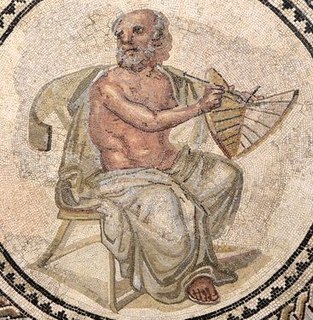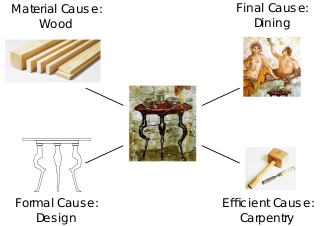External links
| This article about a philosophy-related book is a stub. You can help Wikipedia by expanding it. |
| This article related to a poem is a stub. You can help Wikipedia by expanding it. |
On Nature was a philosophical poem which details Anaximander's theories about the evolution of the Earth, plants, animals and humankind. Anaximander described his theory that humans and other animals descended from fish once the world's oceans began to dry up. Also he described a theory of abiogenesis in his book in the way that he believed that the first life forms formed from mist. We know little about his book because it has been lost or destroyed, however it still remains important today because it describes one of the world's earliest theories of evolution.
| This article about a philosophy-related book is a stub. You can help Wikipedia by expanding it. |
| This article related to a poem is a stub. You can help Wikipedia by expanding it. |

Anaximander, was a pre-Socratic Greek philosopher who lived in Miletus, a city of Ionia. He belonged to the Milesian school and learned the teachings of his master Thales. He succeeded Thales and became the second master of that school where he counted Anaximenes and, arguably, Pythagoras amongst his pupils.

Anaximenes of Miletus was an Ancient Greek Pre-Socratic philosopher active in the latter half of the 6th century BC. The details of his life are obscure because none of his work has been preserved. Anaximenes' ideas and philosophies are only known today because of comments made by Aristotle and other writers on the history of Greek philosophy.
Pessimism is a negative mental attitude in which an undesirable outcome is anticipated from a given situation. Pessimists tend to focus on the negatives of life in general. A common question asked to test for pessimism is "Is the glass half empty or half full?"; in this situation a pessimist is said to see the glass as half empty, while an optimist is said to see the glass as half full. Throughout history, the pessimistic disposition has had effects on all major areas of thinking.

Reason is the capacity of consciously making sense of things, applying logic, and adapting or justifying practices, institutions, and beliefs based on new or existing information. It is closely associated with such characteristically human activities as philosophy, science, language, mathematics, and art, and is normally considered to be a distinguishing ability possessed by humans. Reason is sometimes referred to as rationality.

Teleology or finality is a reason or explanation for something as a function of its end, purpose, or goal. A purpose that is imposed by a human use, such as that of a fork, is called extrinsic.

Spontaneous generation refers to a body of thought on the ordinary formation of living organisms without descent from similar organisms. The theory of spontaneous generation held that living creatures could arise from nonliving matter and that such processes were commonplace and regular. For instance, it was hypothesized that certain forms such as fleas could arise from inanimate matter such as dust, or that maggots could arise from dead flesh. A variant idea was that of equivocal generation, in which species such as tapeworms arose from unrelated living organisms, now understood to be their hosts. The idea of univocal generation, by contrast, refers to effectively exclusive reproduction from genetically related parent(s), generally of the same species.

Karl Marx's theory of alienation describes the social alienation of people from aspects of their human nature as a consequence of living in a society of stratified social classes. The alienation from the self is a consequence of being a mechanistic part of a social class, the condition of which estranges a person from their humanity.

Natural philosophy or philosophy of nature was the philosophical study of nature and the physical universe that was dominant before the development of modern science. It is considered to be the precursor of natural science.

"Survival of the fittest" is a phrase that originated from Darwinian evolutionary theory as a way of describing the mechanism of natural selection. The biological concept of fitness is defined as reproductive success. In Darwinian terms the phrase is best understood as "Survival of the form that will leave the most copies of itself in successive generations."

Mary Beatrice Midgley was a British philosopher. A senior lecturer in philosophy at Newcastle University, she was known for her work on science, ethics and animal rights. She wrote her first book, Beast And Man (1978), when she was in her fifties, and went on to write over 15 more, including Animals and Why They Matter (1983), Wickedness (1984), The Ethical Primate (1994), Evolution as a Religion (1985), and Science as Salvation (1992). She was awarded honorary doctorates by Durham and Newcastle universities. Her autobiography, The Owl of Minerva, was published in 2005.
Arche is a Greek word with primary senses "beginning", "origin" or "source of action", and later "first principle" or "element". By extension, it may mean "first place, power", "method of government", "empire, realm", "authorities", "command". The first principle or element corresponds to the "ultimate underlying substance" and "ultimate undemonstrable principle". In the philosophical language of the archaic period, arche designates the source, origin or root of things that exist. In ancient Greek philosophy, Aristotle foregrounded the meaning of arche as the element or principle of a thing, which although undemonstrable and intangible in itself, provides the conditions of the possibility of that thing.

The watchmaker analogy or watchmaker argument is a teleological argument which states, by way of an analogy, that a design implies a designer. The analogy has played a prominent role in natural theology and the "argument from design," where it was used to support arguments for the existence of God and for the intelligent design of the universe, in both Christianity and Deism.

The four causes are elements of an influential principle in Aristotelian thought whereby explanations of change or movement are classified into four fundamental types of answer to the question "why?". Aristotle wrote that "we do not have knowledge of a thing until we have grasped its why, that is to say, its cause." While there are cases in which classifying a "cause" is difficult, or in which "causes" might merge, Aristotle held that his four "causes" provided an analytical scheme of general applicability.
Matter is the substrate from which physical existence is derived, remaining more or less constant amid changes. The word "matter" is derived from the Latin word māteria, meaning "wood", or “timber”, in the sense "material", as distinct from "mind" or "form". The image of wood came to Latin as a calque from the Greek philosophical usage of hyle (ὕλη).

The history of invertebrate paleozoology differs from the history of paleontology in that the former usually emphasizes paleobiology and the paleoecology of extinct marine invertebrates, while the latter typically emphasizes the earth sciences and the sedimentary rock remains of terrestrial vertebrates.

Evolutionary ideas during the periods of the Renaissance and the Enlightenment developed over a time when natural history became more sophisticated during the 17th and 18th centuries, and as the scientific revolution and the rise of mechanical philosophy encouraged viewing the natural world as a machine with workings capable of analysis. But the evolutionary ideas of the early 18th century were of a religious and spiritural nature. In the second half of the 18th century more materialistic and explicit ideas about biological evolution began to emerge, adding further strands in the history of evolutionary thought.

The Ionian Enlightenment was a set of advances in scientific thought, explanations on nature, and discovering the natural and rational causes behind observable phenomena, that took place in archaic Greece beginning in the 6th century BC. This movement began on the Ionian coast of western Anatolia by small numbers of forward-thinking Greeks from cities such as Miletus, Samos, and Halicarnassus. They saw the world as something ordered and intelligible, its history following an explicable course and its different parts arranged in a comprehensible system. Most historians agree that Thales, one of the Seven Sages of Greece, started this movement by predicting a solar eclipse that actually occurred, though some believe this feat to be false.

Evolutionary thought, the recognition that species change over time and the perceived understanding of how such processes work, has roots in antiquity—in the ideas of the ancient Greeks, Romans, and Chinese as well as in medieval Islamic science. With the beginnings of modern biological taxonomy in the late 17th century, two opposed ideas influenced Western biological thinking: essentialism, the belief that every species has essential characteristics that are unalterable, a concept which had developed from medieval Aristotelian metaphysics, and that fit well with natural theology; and the development of the new anti-Aristotelian approach to modern science: as the Enlightenment progressed, evolutionary cosmology and the mechanical philosophy spread from the physical sciences to natural history. Naturalists began to focus on the variability of species; the emergence of paleontology with the concept of extinction further undermined static views of nature. In the early 19th century Jean-Baptiste Lamarck (1744–1829) proposed his theory of the transmutation of species, the first fully formed theory of evolution.

Genesis (2006) is a philosophical science fiction novel by New Zealand author Bernard Beckett. It won the 2007 Esther Glen Award for children's literature, and the 2007 New Zealand Post Book Awards for Children and Young Adults. As of 2008 it has been published in 22 countries.
Apeiron is a Greek word meaning "(that which is) unlimited," "boundless", "infinite", or "indefinite" from ἀ- a-, "without" and πεῖραρ peirar, "end, limit", "boundary", the Ionic Greek form of πέρας peras, "end, limit, boundary". It is akin to Persian piramon, meaning "boundary, circumference, surrounding".